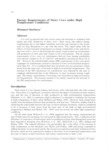It is well recognized that heat stress causes the decrease in voluntary feed intake and milk production in dairy cows. Heat stress also affects energy requirements due to the higher metabolic activities and increase in the investment for heat dissipation to cope with the stress. This report deals with the effects of environmental temperatures on energy metabolism of dry and lactating cows with a view to determining the energy requirements for maintenance and production of milk plus body tissues in hot environments. The net energy requirements of dry cows for maintenance derived from fasting metabolism were almost constant at 18°, 27° and 32°C and tended to increase by about 5% at 36°C. However the metabolizable energy (ME) requirements of dry cows given roughages for maintenance started to increase at lower environmental temperatures than 32°C. It is considered that heat increment acts as a promoter of heat stress from the inner part of the body at high environmental temperatures. The increase in the ME rquirements for maintenance was affected by the type of roughage administered due to the difference in heat increment among roughages. The energy requirements of lactating cows increased at high environmental temperatures. The increase seemed to be mainly caused by the increase in the ME requirements for maintenance.

